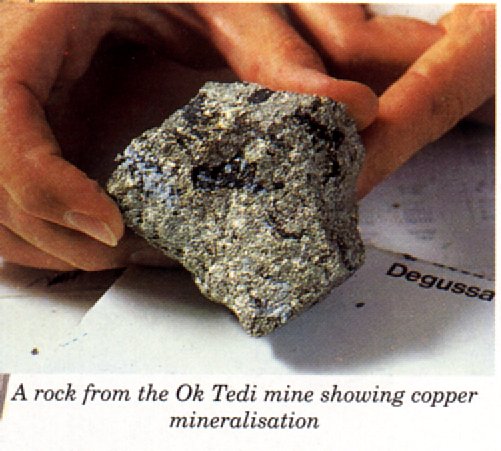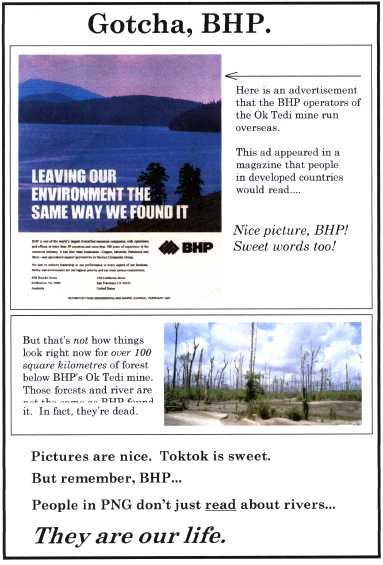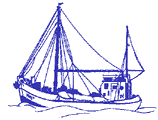StakeholdersMining IndustryA large investment is required to set up a mine. Even global companies seek consorts, to raise funds and to distribute the risk. "Ok Tedi Mining Limited" (OTML) was founded under the leadership of Broken Hill Proprietary (BHP) (Australia), that held a 30% share, Amoco Minerals (owned by Standard Oil Indiana) 30%, Metallgesellschaft, Degussa and the German State Agency "Entwicklungsgesellschaft" 20%, and the state of PNG 20%. US$ 1.400 billion were invested. Only US$ 300 million were contributed as genuine cash capital, but US$ 1.1 billion were financed by bank loans. There is no statement, how much interest was paid, till the credit for the investment was paid off. The first preference dividend was paid 1991. This leads to the suspicion, that the real profits have been made outside PNG.In 1993 ownership of OTML changed. BHP increased its share to 60%, Metallgesellschaft and Amoco quit the enterprise, and a new shareholder appeared, Inmet (Canadian), which bought 20%. In the year 1999, the state of PNG bought 8% from BHP and 2% from Inmet, so it is holding 30%. BHP repeatedly threatened to sell its share, because Ok Tedi is the project, for which the whole mining business is discredited. Especially after the lawsuit at Melbourne in 1996, BHP was blamed worldwide. Of greatest concern in the public was - this became evident in our press conference in Port Moresby - that BHP may sell to a company from East Asia or similar, that would not be submitted to political or economic pressure, to act responsibly. The cost for environmental protection and for social development was probably not the reason, to pay no or minor dividends. If there is an economic motive for BHP, to get rid of its share, it might be the cost of rehabilitation after mine closure. This cost is not discussed in the mine closure plan, but postponed to further studies. Ok Tedi and many other projects in developing countries spoiled the reputation of the mining industry as a whole, which caused CEOs to worry: "Despite the industry's efforts, mining has fallen into increasing public disfavour. Many accept it grudgingly as a necessary evil. Others take as read the assertion that the industry is incompatible with sustainable development. There is a gap, which sometimes seems like a gulf, between the industry's self-perception and how others see it. Society's standards and priorities have shifted. Industry's behaviour must not only shift in line but must where possible try to anticipate future shifts. The current set of perceptions, if left unchecked, will have a direct effect on the fortunes of the industry. Moreover, they will drive legislation and distort markets in ways that will ultimately harm developing economies, and produce unintended environmental and social consequences." Sir Robert Wilson, Rio Tinto, Report on the Governors Meeting for the Mining and Metals Industry, 1 February 2000, Davos, SwitzerlandIn 1999, 27 global mining companies started a Global Mining Initiative (GMI), to find out, how mining can be made "sustainable". In a letter to IIED, a coalition
of the main NGO groups working on mining issues (including Mineral Policy
Institute) expressed their scepticism about the role and composition of
the assurance group.
The positive aspect
is seen by MPI
GMI yielded a bulky description of problems, and a conference held in Toronto in May 2002, appealing to all stakeholders to find together. It does not even aim at a "code of conduct", that would set minimum standards of environmental and social performance of mining. No independent control is implemented. GMI tries to "greenwash" the mining business, and soothe shareholders, but it will not prevent further "Ok Tedis". State GovernmentWhen PNG had become
an independent state in 1975, government was not experienced what it meant
to permit a business like Ok Tedi Mine. Considering Bougainville, which
was permitted by the former Australian administration, the independent
government under prime minister Michael Somare expected a larger share
of benefits from mining. Of course they sought advice from the World Bank
and development agencies of the rich countries, which warmly recommended
the project. The terms of the partnership between state and companies were
fixed in the Ok Tedi Agreement of 1976, which Sir Michael Somare called:
"recognized around the world as possibly the best mining agreement between a developing nation and multinational corporations".(Ok Tedi 24:00)To buy its 20% share of OTML, the state of PNG lend money (US$ 60 million) from foreign banks. The returns of investment were to small, to shake off the interest burden. To keep investors content, and attract more of them, infrastructure like roads, airline, telecommunication had to be developed, and state debt increased more rapidly. The export/import balance was improved by OTML's sales, but diminished for buying mine equipment abroad, and paying interests to foreign banks. Environmental experts were asked for advice, too, but not listened to. The present state of Ok Tedi was foreseen, as can be read in the "Smoking Gun Files". It is a cheap excuse, that scientists would not provide sufficient evidence: "In a country as large, diverse and still unexplored, in both biological and geological terms, as Papua New Guinea, we should not be surprised if we do not always get Environmental Impact Assessments just right at the first attempt". Sir John Kaputin, the Minister for Mining in Papua New Guinea: "The role of the resource sector in the economic reconstruction of Papua New Guinea", Mining and Petroleum Investment conference, 29 November 1999 (from Mining Monitor)In 2000, after some ups and downs common to PNG policies, Somare became Mining Minister. When visiting Fiji, he warned Pacific Island governments, that while mining may seem appealing as a lucrative path of development, there are serious costs that should make governments wary. "We have learnt a lesson and I am saying it loud and clear to the Pacific Island countries, to be careful of mining companies" Somare said in May 2000 in Fiji.("PNG warns Govt", Fiji Daily Post, 8 May 2000, page 3. ) (from Mining Monitor)When the Hamburgian delegation met with Somare's Secretary, Mr. Kuma Aua, he opened his statement, the Department of Mining were always very supportive to mining and OTML. Mr. Aua is member of the (supervisory) board of OTML. Norddeutsche Affinerie (NA, Affi)To secure a safe supply
of copper ore concentrate, the Ok Tedi site was partly developed by Degussa
and Metallgesellschaft, two major shareholders of Affi then, assisted by
the German state agency Deutsche Entwicklungsgesellschaft. Besides gold,
that may be processed by Degussa, the only German company interested in
copper ore was, and still is Affi. When Ok Tedi Mine started production
of copper ore concentrate, it was marketed by Metallgesellschaft.

The name "Degussa" on the paper sheet indicates the business connection. The picture is taken from a booklet, published by the Department of Mining in 1994.
In 1997, OTML and
Affi celebrated the deliverance of the first million tons of ore concentrate.
This is a 20% share of OTML's production till that date, so Affi is called
"largest single smelter customer" by OTML.
At the end of the visit to
PNG, at the press conference, Affi was very cautious to admit its responsibility.
They promised to use influence as a customer, that OTML may improve environmental
care. But they are not willing to apply pressure, to cut buying Ok Tedi
ore. Affi announced to contribute to a social project in the Ok Tedi area.
See text of NA press
release at PNG.
In an evaluation discussion
between Save the Elbe, Pacific Network, and Affi's board, Affi did not
change its position. Affi offered, to ask Global Mining Initiative, to
include smelter companies (thus become a Global Metals Initiative), and
locate one of their discussions and workshops to Hamburg. The direct contribution
to Ok Tedi will be in the field of health care.
LandownersLandowners have a
strong position in PNG. The villagers immediately neighbouring the mine
negotiated considerable compensation payments. With assistence of OTML,
several landowners started small businesses, which are mostly contractors
of the mine. 80 companies with 1000 jobs rised (and fall?) with the mine.
However, people downstream
were neglected in the beginning, and when damage of the Ok Tedi threatened
them, the fighting began. Each group negotiated a different scheme, how
and how much it was compensated. The toughest struggle probably arouse,
when the Aywin and Yonggom people (to the east, respectively west bank
of Lower Ok Tedi) sued OTML at an Australian court in 1994, and settled
the matter outside of court in 1996. Different from former agreements,
OTML was committed to seek for a solution of the environmental problems,
namely to build a tailings pipeline to a safe disposal site (Bige). Since
OTML hesitates to built a pipeline, the next litigation has started.
Landowners do not act jointly
throughout the region. If they did, OTML would really be in trouble. OTML
is distributing benfits in different ways, that are not transparent to
the public. So each landowner group may believe, to get more than the rest,
or suspect, to be cheated. Knowing, that there are just ten years left,
for some the race is on, to get a bonus.
EnvironmentalistsEnvironmental Protection
is a constitutonal obligation to the PNG people. But that 's the theory.
Considering the difficulties, environmentalists are quite successful in
PNG, to maintain public and political awareness.
More than in Germany, the
promise of an investor to provide jobs, will beat any ecologic objection.
The strategy to win public agreement and political support is, to claim
environmental justice. Companies from developed countries should not be
allowed to do things in PNG, that never were permitted in their home country.
|
This is the position of the Environmental Law Centre PNG, NANGO, NGO
Environmental Working Group, Pacific Heritage Foundation, Partners with
Melanesia and Greenpeace Pacific on the closure of the Ok Tedi mine, August
1999:
1. River systems should not be used to dispose of mine waste |
Church
New Guinea was a target of
intensive Christian mission, since it was taken colony. This mission, however,
had not the character of "confess or die", like in the colonisation of
Spanish America. Different churches had rather to compete for souls, and
convince them by additional benefits like health care and school education.
In the Ok Tedi area, missions are the only institutions besides OTML, that
offer social services. In its closure plan, OTML considers churches as
the stakeholders, that might take over facilities like health-centres and
schools. Whether churches will welcome this, or more regard it as an additional
burden, depends on the financial aid connected to the donation, and the
way OTML will manage the transition.
Ok Tedi was recognized by the Evangelical Church as the example, that church is responsible not only for the redemption of men, but for the conservation of God's creation. The issue was discussed broadly in Germany, after the Starnberg Institute released its study on Ok Tedi, which was initiated by the Evangelical Mission Work. It was not related to production and consumption of copper in Germany, but mainly understood in the context of development of third world countries.
In Germany, each church has a spiritual relation to copper, because church bells are made of bronze. Many churches at Hamburg are roofed with copper sheet. NA took the opportunity to improve its reputation, sponsoring the new copper roof of St. Peter's, St. Jake's, or fixing the bronze statue of St. Michael's, all main evangelical churches. Therefore, the Evangelical Church is in a prominent, but delicate position, to raise the question of clean copper from the consumer's side.
Ok Tedi was recognized by the Evangelical Church as the example, that church is responsible not only for the redemption of men, but for the conservation of God's creation. The issue was discussed broadly in Germany, after the Starnberg Institute released its study on Ok Tedi, which was initiated by the Evangelical Mission Work. It was not related to production and consumption of copper in Germany, but mainly understood in the context of development of third world countries.
In Germany, each church has a spiritual relation to copper, because church bells are made of bronze. Many churches at Hamburg are roofed with copper sheet. NA took the opportunity to improve its reputation, sponsoring the new copper roof of St. Peter's, St. Jake's, or fixing the bronze statue of St. Michael's, all main evangelical churches. Therefore, the Evangelical Church is in a prominent, but delicate position, to raise the question of clean copper from the consumer's side.
Save the Elbe
"Save the Elbe" will not
expand its activities, to become "Save the Ok Tedi", nor will it give advice,
nor become a "stakeholder" at PNG. We introduced NA as a stakeholder to
PNG. Our report of the travel to PNG may contribute to the discussion about
the mine closure plan among PNG environmentalists. Still the target of
our work is NA, to make it a clean copper-smelter at Hamburg, from the
mine to products to recycling of products. Ok Tedi is but an example, that
environmental problems within the copper production chain must not be exported
to foreign countries.
Original issue April 2001
last update March 2003




 rettet-die-elbe.de
rettet-die-elbe.de
